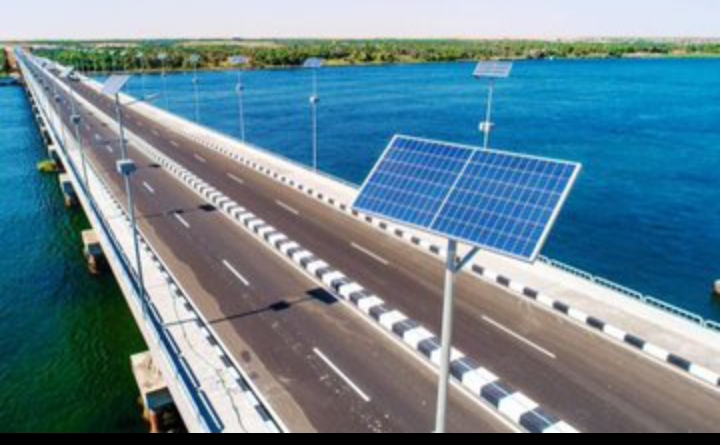Road infrastructure is a key factor for economic development and social integration in Africa. It facilitates trade, tourism, and access to basic services such as health and education. However, many African countries still face challenges in building and maintaining their road networks, such as lack of funding, poor governance, and environmental issues. In this article, we will look at the top 10 African countries with the best road infrastructure, according to the International Monetary Fund (IMF), and how they achieved this feat.
South Africa: The Leader in Road Infrastructure
South Africa ranks first among African countries with the best road infrastructure, with a score of 100 out of 100, according to the IMF. The country has a total road network of about 750,000 kilometers, of which 158,952 kilometers are paved. South Africa has invested heavily in its road infrastructure, especially in the Gauteng province, which is the economic hub of the country. The Gautrain, a high-speed rail system that connects Johannesburg, Pretoria, and the OR Tambo International Airport, is one of the most notable projects in the region. South Africa also has a well-developed toll road system, which helps to generate revenue for road maintenance and improvement.
Namibia: A Model for Road Development
Namibia is the second-best African country in terms of road infrastructure, with a score of 99 out of 100, according to the IMF. The country has a total road network of about 64,000 kilometers, of which 15,000 kilometers are paved. Namibia has adopted a proactive approach to road development, with a focus on rural and regional connectivity, safety, and sustainability. The country has established the Road Fund Administration (RFA), which collects and manages funds for road maintenance and rehabilitation from various sources, such as fuel levies, vehicle registration fees, and tolls. Namibia also has a Road Authority (RA), which is responsible for planning, designing, constructing, and managing the national road network.
Morocco: A Pioneer in Road Innovation
Morocco is the third-best African country in terms of road infrastructure, with a score of 95 out of 100, according to the IMF. The country has a total road network of about 180,000 kilometers, of which 59,474 kilometers are paved. Morocco has embarked on an ambitious road modernization program, which aims to increase the share of paved roads to 80% by 2030. The country has also invested in innovative projects, such as the Mohammed VI Bridge, which is the longest cable-stayed bridge in Africa, and the Tanger-Med Port, which is the largest port in Africa and the Mediterranean. Morocco also has a successful public-private partnership (PPP) model, which has attracted foreign investors and lenders to finance its road projects.
Botswana: A Success Story in Road Management
Botswana is the fourth-best African country in terms of road infrastructure, with a score of 91 out of 100, according to the IMF. The country has a total road network of about 77,000 kilometers, of which 10,217 kilometers are paved. Botswana has achieved remarkable progress in road management, thanks to its sound policies, institutions, and practices. The country has established the Department of Roads (DOR), which is responsible for the planning, design, construction, and maintenance of the primary road network. The country has also created the Road Maintenance Fund (RMF), which is financed by fuel levies, vehicle license fees, and road user charges. Botswana also has a Road Asset Management System (RAMS), which is a computerized tool that helps to monitor and optimize the performance of the road network.
Read How Rwanda is Creating a New Generation of Green and Affordable Homes
Libya: A Challenge for Road Recovery
Libya is the fifth-best African country in terms of road infrastructure, with a score of 90 out of 100, according to the IMF. The country has a total road network of about 100,000 kilometers, of which 47,590 kilometers are paved. Libya has a strategic location in North Africa, connecting the Mediterranean Sea with the Sahara Desert. The country has a potential to develop its road infrastructure, especially in the areas of trade, tourism, and regional integration. However, the country has been facing political and security instability since the 2011 uprising, which has severely affected its road sector. The country needs to restore its road governance, finance, and maintenance, as well as to address the issues of road safety, quality, and sustainability.
Algeria: A Vision for Road Expansion
Algeria is the sixth-best African country in terms of road infrastructure, with a score of 88 out of 100, according to the IMF. The country has a total road network of about 113,655 kilometers, of which 71,177 kilometers are paved. Algeria has a vision to expand its road infrastructure, especially in the southern and eastern regions, which are less developed and more isolated. The country has launched several mega-projects, such as the East-West Highway, which is the longest highway in Africa, spanning 1,216 kilometers from the Tunisian border to the Moroccan border. The country has also implemented the National Road Program (PNR), which aims to upgrade and rehabilitate 28,000 kilometers of roads by 2024.
Zimbabwe: A Hope for Road Improvement
Zimbabwe is the seventh-best African country in terms of road infrastructure, with a score of 83 out of 100, according to the IMF. The country has a total road network of about 97,267 kilometers, of which 18,481 kilometers are paved. Zimbabwe has a rich history and culture, as well as a diverse natural environment, which offer great opportunities for tourism and trade. However, the country has suffered from economic and political crises, which have deteriorated its road infrastructure. The country needs to improve its road governance, finance, and maintenance, as well as to address the issues of road safety, quality, and sustainability. The country has received support from various donors and partners, such as the World Bank, the African Development Bank, and the European Union, to rehabilitate and upgrade its road network.
Egypt: A Hub for Road Connectivity
Egypt is the eighth-best African country in terms of road infrastructure, with a score of 83 out of 100, according to the IMF. The country has a total road network of about 137,430 kilometers, of which 65,050 kilometers are paved. Egypt has a strategic location in North Africa, connecting the Mediterranean Sea with the Red Sea, and the Nile River with the Suez Canal. The country has a potential to become a hub for road connectivity, especially in the areas of trade, tourism, and regional integration. The country has invested in several projects, such as the Rod El Farag Axis, which is the widest suspension bridge in the world, and the New Administrative Capital, which is a planned city that will host the government and the parliament. The country has also adopted a PPP model, which has attracted private investors and operators to finance and manage its road projects.
Ivory coast: A Progress for Road Rehabilitation
Ivory coast is the ninth-best African country in terms of road infrastructure, with a score of 78 out of 100, according to the IMF. The country has a total road network of about 85,000 kilometers, of which 6,500 kilometers are paved. Cˆote d’Ivoire has a rich and diverse economy, based on agriculture, mining, and services. However, the country has faced civil wars and political instability, which have damaged its road infrastructure. The country has made significant progress in road rehabilitation, with the support of the IMF, the World Bank, and the African Development Bank. The country has also implemented a Road Maintenance Fund (RMF), which is financed by fuel taxes, vehicle fees, and tolls.
Tunisia: A Potential for Road Integration
Tunisia is the tenth-best African country in terms of road infrastructure, with a score of 78 out of 100, according to the IMF. The country has a total road network of about 23,500 kilometers, of which 19,232 kilometers are paved. Tunisia has a strategic location in North Africa, bordering the Mediterranean Sea, Algeria, and Libya. The country has a potential to develop its road infrastructure, especially in the areas of trade, tourism, and regional integration. The country has invested in several projects, such as the Trans-Maghreb Highway, which is a regional road corridor that links Tunisia, Algeria, and Morocco. The country has also adopted a PPP model, which has attracted private investors and operators to finance and manage its road projects.
Conclusion: African Countries with Best Road Infrastructure
In this article, we have seen the top 10 African countries with the best road infrastructure, according to the IMF. These countries have demonstrated their commitment and efforts to improve their road networks, which are essential for their economic and social development. However, there are still many challenges and opportunities for road infrastructure in Africa, such as funding, governance, maintenance, safety, quality, and sustainability. Therefore, it is important for African countries to continue to invest in their road infrastructure, as well as to cooperate and learn from each other, in order to achieve their common goals and aspirations.
Mbiydzela
- Mbiydze is a web and graphic designer, digital marketer, and founder of a group of companies including CHEETAH CAMEROON, MBIYDZELA DIGITAL and PULSEBEAT ENTERTAINMENT He is an ambitious entrepreneur with experience in various fields.
Latest entries
 NewsApril 20, 2024Incident Near Trump Trial: Man Sets Himself on Fire
NewsApril 20, 2024Incident Near Trump Trial: Man Sets Himself on Fire SocietyApril 17, 2024Daniel Nsang video leaked online
SocietyApril 17, 2024Daniel Nsang video leaked online NewsApril 10, 2024NOLLYWOOD ACTOR JUNIOR POPE D!ES IN BOATING ACCIDENT
NewsApril 10, 2024NOLLYWOOD ACTOR JUNIOR POPE D!ES IN BOATING ACCIDENT SocietyApril 4, 2024EFCC Investigates Bobrisky for Alleged Naira Abuse
SocietyApril 4, 2024EFCC Investigates Bobrisky for Alleged Naira Abuse



